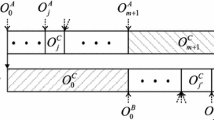Abstract
This paper addresses a generalization of the coupled-operations scheduling problem in the context of a flow shop environment. We consider the two-machine scheduling problem with the objective of minimizing the makespan. Each job consists of a coupled-operation to be processed first on the first machine and a single operation to be then processed on the second machine. A coupled-operation contains two operations separated by an exact time delay. The single operation can start on the second machine only when the coupled-operation on the first machine is completed. We prove the NP-completeness of two restricted versions of the general problem, whereas we also exhibit several other well solvable cases.










Similar content being viewed by others
References
Ageev, A. (2008). A \(\frac{3}{2}\)-approximation for the proportionate two-machine flow shop scheduling with minimum delays. In Lecture Notes in Computer Science (Vol. 4927, pp. 55–66).
Ageev, A. A., & Baburin, A. E. (2007). Approximation algorithms for UET scheduling problems with exact delays. Operations Research Letters, 35, 533–540.
Ageev, A. A., & Kononov, A. V. (2007). Approximation algorithms for scheduling problems with exact delays. In WAOA 2006, LNCS (Vol. 4368, pp. 1–14).
Ahr, D., Békési, J., Galambos, G., Oswald, M., & Reinelt, G. (2004). An exact algorithm for scheduling identical coupled tasks. Mathematical Methods of Operational Research, 59, 193–203.
Blazewicz, J., Ecker, K., Kis, T., Potts, C. N., Tanas, M., & Whitehead, J. (2010). Scheduling of coupled tasks with unit processing times. Journal of Scheduling, 13, 453–461.
Blazewicz, J., Pawlak, G., Tanas, M., & Wojciechowicz, W. (2012). New algorithms for coupled tasks scheduling—A survey. RAIRO - Operations Research, 46(04), 335–353.
Brauner, N., Finke, G., Lehoux-Lebacque, V., Potts, C., & Whitehead, J. (2009). Scheduling of coupled tasks and one-machine no-wait robotic cells. Computers and Operational Research, 36(2), 301–307.
Chu C., & Proth, J.-M. (1994). Sequencing with chain structured precedence constraints and minimal and maximal separation times. In Proceedings of the fourth international conference on computer integrated manufacturing and automation technology (pp. 333–338).
Dell’Amico, M. (1996). Shop problems with two machines and time lags. Operations Research, 44(5), 777–787.
Fondrevelle, J., Oulamara, A., & Portmann, M. C. (2006). Permutation flowshop scheduling problem with maximal and minimal time lags. Computers and Operations Research, 33, 1540–1556.
Fondrevelle, J., Oulamara, A., & Portmann, M. C. (2008). Permutation flow shop scheduling problems with time lags to minimize the weighted sum of machine completion times. International Journal of Production Economics, 112, 168–176.
Garey M. R., & Johnson D. S. (1979). Computers and intractability: A guide to the theory of NP-completeness, V. Klee (Ed.). A series of books in the mathematical sciences. San Francisco, CA: W.H. Freeman and Co.
Johnson, S. M. (1954). Optimal two and three stage production schedules with setup time included. Naval Research Logistics Quarterly, 1, 61–67.
Karuno, Y., & Nagamochi, H. (2003). A better approximation for the two-machine flowshop scheduling problem with time lags. In Algorithms and computation: 14th international symposium, ISAAC 2003, Kyoto, Japan, December 15–17, 2003.
Mitten, L. G. (1958). Sequencing \(n\) jobs on two jobs with arbitrary time lags. Management Science, 5(3), 293–298.
Orman, A. J., & Potts, C. N. (1997). On the complexity of coupled-task scheduling. Discrete Applied Mathematics, 72, 141–154.
Shapiro, R. D. (1980). Scheduling coupled tasks. Naval Research Logistics Quarterly, 20, 489–498.
Simonin, G., Giroudeau, R., & Konig, J. C. (2010). Polynomial-time algorithms for scheduling problem for coupled-tasks in presence of treatment tasks. Electronic Notes in Discrete Mathematics, 36, 647–654.
Yu, W., Hoogeveen, H., & Lenstra, J. K. (2004). Minimizing makespan in a two-machine flow shop with delays and unit-time operations is NP-hard. Journal of Scheduling, 7, 333–348.
Acknowledgements
The authors gratefully wish to thank the anonymous reviewers for their careful reading of this paper and for their valuable and useful comments. Their contributions greatly helped to improve the paper.
Author information
Authors and Affiliations
Corresponding author
Rights and permissions
About this article
Cite this article
Meziani, N., Oulamara, A. & Boudhar, M. Two-machine flowshop scheduling problem with coupled-operations. Ann Oper Res 275, 511–530 (2019). https://doi.org/10.1007/s10479-018-2967-z
Published:
Issue Date:
DOI: https://doi.org/10.1007/s10479-018-2967-z




